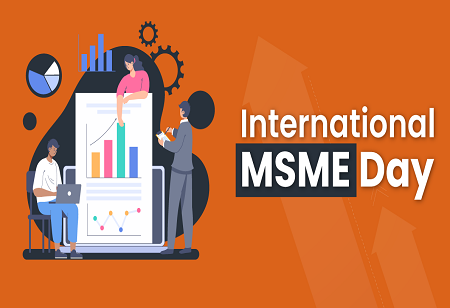
Economic wealth, aside from farming output, is created through enterprises. When economists, policymakers, and ordinary citizens do discussion on economic growth, they mostly talk about the expansion of enterprise output. On 27th June, the world is celebrating the 5th anniversary of the Micro, Small and Medium-sized Enterprises Day - MSME Day and strengthening the backbone of the world economy. The United Nations General Assembly adopted a resolution on 6th April 2017.
The principal theme of the Day is to achieve the World's Sustainable Development Goals, promote innovation and creativity, and create employment internationally. The General Assembly declared 27 June Micro-, Small, and Medium-sized Enterprises Day to elevate public recognition in their contribution to sustainable improvement and the worldwide economy. Small businesses account for over 70% of businesses and more than 50% of jobs worldwide. Large firms contribute substantially to economic growth and wealth creation. Still, the aggregate contribution of small and medium-sized enterprises (SMEs) is also considerable— in some countries, it is greater than that of large enterprises. Along with output, SMEs create jobs, make investments, and export their goods to foreign markets. Dynamic and innovative SMEs expand their sector's and country's technological frontiers.
The COVID-19 crisis has taught us that the pandemic and containment measures do not impact everyone in the same way. Among the private sector, Micro-, Small and Medium-sized Enterprises (MSMEs), especially those led by women, youth, ethnic minorities and migrants, have gone through various challenges. An International Trade Centre survey on COVID-19 impact among businesses in 136 countries has shown that nearly 62% of women-led small businesses have been strongly affected by the crisis, compared to just over half of firms led by men and women-owned are 27% more likely not to survive the pandemic.
Digging up History
The United Nations (UN) designated twenty-seventh of June as Micro, Small and Medium-sized Enterprises Day via a decision of the UN General Assembly in April 2017. In May 2017, an application,' Enhancing National Capacities for Unleashing Full Potentials of MSMEs in Achieving the SDGs in Developing Countries', was launched. It has been funded via the 2030 Agenda for Sustainable Development Sub-Fund of the United Nations Peace and Development Fund. MSMEs are critical to the assembly of the Sustainable Development Goals. Efforts to enhance credit scores' admission to SMEs in critical regions of country-wide economies are essential to attaining the SDGs. As MSMEs begin to stand up more potent from the aftereffects of Covid-19, MSME Day recognizes the vital function those adaptable marketers play in reinforcing the nearby and worldwide economies. MSMEs play a significant role in selling financial boom and producing jobs for prone populations in all social groups.
Significance
The UN dreams of international locations to realize sustainable development goals and create cognizance of them. Formal and informal MSMEs make up over 90% of all businesses and account, on average, for 70% of fashionable employment and 50% of GDP. As such, they are vital actors in attaining a green recovery.
Micro-enterprise: Fewer than ten employees and an annual turnover (the amount of money taken in a particular period) or a balance sheet (a statement of a company’s assets and liabilities) below €2 million.
Small enterprise: Fewer than 50 employees and an annual turnover or balance sheet below €10 million.
Medium-sized enterprise: Fewer than 250 employees and annual turnover below €50 million or balance sheet below €43 million.
Themes:
MSME Day 2022: The architecture for India's stronger, equitable economic growth
MSME Day 2021: Key to an inclusive and sustainable recovery.
MSME Day 2020: COVID-19: The Great Lockdown and its impact on Small Business.
MSME Day 2019: ‘Big Money For Small Business: Financing the SDGs’. And the theme is dedicated towards raising awareness of need for greater investment.
MSME Day 2018: The Youth Dimension.
MSMEs are major job providers and catalysts for growth.
MSME are a critical force in realizing the Sustainable Development Goals (SDGs).
MSME is promoting innovation, creativity and decent work for all.
MSME Day 2017: ‘Small Business, Big Impact.‘MSMEs make up over 90% of the world’s economy.
The Global Council for the Promotion of International Trade is based in India, South Africa, the United States and the United Kingdom, with board & council member representation worldwide. ITC focuses on four priority areas to scale up support to small firms for MSME Day and beyond - women, youth, digital and green initiatives. These are the key to creating a wave of ‘good trade’ that is truly inclusive and sustainable.
This year, the MSME Day celebration is with global perspectives from various departments, ministries, chambers of commerce and international organizations. The belief is that global perspectives have a significant impact on paving the way for the future. “Coordinated global response is key to MSMEs’ post-pandemic economic recovery”, says Deputy Director-General Xiangchen Zhang, World Trade Organization.
Role of SMEs in Asia Economy growth
In Asia-Pacific, SMEs comprise more than 98% of the number of enterprises. These contribute from about 17% to the national GDP in the low-income countries, including India, to about 40 to 50% in the higher-income countries like Malaysia and Singapore.
We are entering an age of volatility and complexity where SMEs will continue to promote business ownership and entrepreneurial skills. Considering Asia in general, SMEs have generated the most significant employment opportunities, second only to agriculture employing more than 50% of the workforce. Matter of this, if we pick any country in the Asia Pacific as an example, we will find that SMEs play an essential role in their countries' overall social and economic well-being.
We use cookies to ensure you get the best experience on our website. Read more...